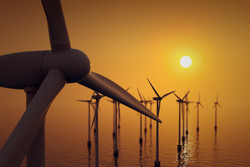Developing a reliable wind ‘super grid’ for Europe
EU-funded researchers are involved in the development of a pan-European ‘super grid’ capable of dispersing wind power across Member States. This will bring more renewable energy into homes and businesses, help reduce reliance on fossil fuels and enable Europe to move closer towards achieving energy independence. This final point is an important consideration given that half the energy consumed in Europe in 2012 was imported from outside the EU. The EU-funded MEDOW project, which runs until March 2017, is a training project that has identified the development of a direct current (DC) grid as an efficient way of transmitting and sharing wind power. This pan-European grid, rather than single point-to-point connections, will reinforce reliability and help balance power supply and demand. The concept makes practical sense. While new wind farms are increasingly being placed offshore where wind speeds are higher and turbines less intrusive, this means that power is generated far from where it is used. Finding more efficient ways of transporting power to onshore grids will help achieve significant cost savings. The idea of a European renewables power grid has gained support from both the academic and environmental community. This DC grid is based on newly emerging technology and will be the focal point of the offshore super grid. The MEDOW project, which began in 2013, will study operational issues such as DC power flow, DC relaying protection and dynamic stability. DC grids for offshore wind power transmission and onshore AC grid interconnection will also be investigated. Various simulation platforms and experimental test rigs will be used in the project. Researchers are confident that the potential is there. The EU’s wind energy sector has enjoyed average annual growth of 15.6 % over the last 17 years, while a recent European Environment Agency report, entitled Europe's Onshore and Offshore Wind Energy Potential, stated that European wind power capacity in 2020 could be three times greater than Europe’s expected electricity demand, rising to a factor of seven by 2030. MEDOW is a Marie Curie Initial Training Network project and involves researchers from five universities and six industrial organisations. Each institution in the consortium is involved on account of their expertise in the manufacturing, design, operation, and control of multi-terminal DC grids. Three visiting scientists of international stature have been appointed to further strengthen the training aspect of MEDOW, which has received EUR 3.9 million in EU funding through the FP7 Programme. Indeed, while searching for a grid solution, the project is helping to train early career researchers and will create a pool of researchers and operators developing DC grids, and nurture expertise in academia, research institutes and manufacturers. These researchers will receive interdisciplinary training in different countries to improve career opportunities. Research results will then be disseminated through publications and direct application in the industries. In this way, the MEDOW project team hopes that their research will make a significant contribution towards the establishment of a pan-European electricity transmission network, delivering a single European electricity market, developing sustainable energy technology and creating jobs. For further information, please visit: MEDOW http://sites.cardiff.ac.uk/medow/
Countries
United Kingdom



